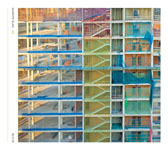|
|
 |
Dusted Reviews
Artist: Giuseppe Ielasi Album: Aix Label: 12k Review date: Feb. 6, 2009 |

|
|
|
 |
Milanese guitarist and electronic musician Giuseppe Ielasi is best known for his languidly beautiful, yet painstakingly wrought drone poems. His finest releases – 2003’s Plans (Sedimental) and 2007’s stunning August (12k) – are set apart by Ielasi’s attention to the smallest of details in his sound sources, which are left largely untreated. Pieces seem to unfold out of the hypnotic ebb and flow of crackling field recordings, warmly linear guitar lines and burbling electronics.
On first listen, Aix – named for Aix-en-Provence, where the album was recorded – appears to mark a shift, however subtle, in Ielasi’s solo work. The emphasis is more on rupture and rhythm, rather than on the soft, stream-of-consciousness flow that is Ielasi’s hallmark, but it’s still as immersive and atmospheric as ever. Ielasi constructed the nine untitled pieces that make up the album along the lattice points of a rhythmic grid, using chopped up samples and fragments of piano, drums, guitar, trumpet, vinyl and other less-easily decipherable sources as basic musical building blocks.
In spite of its adherence to what would seem to be the grid’s rigid confines, from the first kerthumping downbeat and subsequent unspooling of "Untitled 01," Aix has a glorious, disorienting funkiness to it. Tracks have a loose-limbed swing that draws liberally from jazz and dance music while using the techniques of musique concrète. Though the music is immediately engaging (think of Jan Jelinek’s early albums for a slightly more techno-inflected relative), it also reveals different facets of itself with every listen. Ielasi’s use of the grid allows him to layer his unusual array of sounds into extraordinary, interlacing patterns that shimmer and skitter across the breadth and depth of the stereo field. Once you focus in, it’s easy to immerse yourself in every fine, yet uncluttered detail, so that when the last off-kilter bass loop fades into the distance at the end of the lovely, and very melancholic, closing track, there’s a palpable sense of loss.
By Susanna Bolle
|







